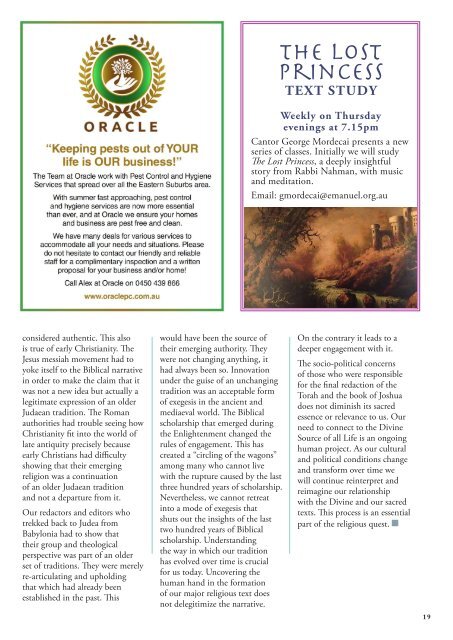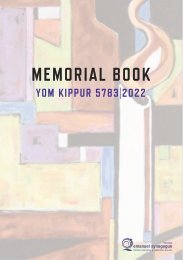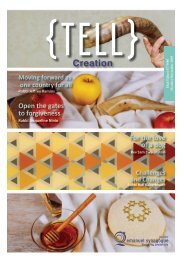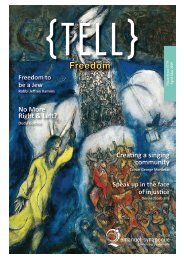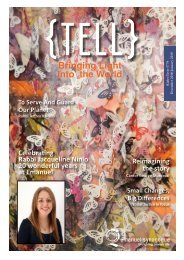Create successful ePaper yourself
Turn your PDF publications into a flip-book with our unique Google optimized e-Paper software.
The Lost<br />
Princess<br />
TEXT STUDY<br />
Weekly on Thursday<br />
evenings at 7.15pm<br />
Cantor George Mordecai presents a new<br />
series of classes. Initially we will study<br />
The Lost Princess, a deeply insightful<br />
story from Rabbi Nahman, with music<br />
and meditation.<br />
Email: gmordecai@emanuel.org.au<br />
considered authentic. This also<br />
is true of early Christianity. The<br />
Jesus messiah movement had to<br />
yoke itself to the Biblical narrative<br />
in order to make the claim that it<br />
was not a new idea but actually a<br />
legitimate expression of an older<br />
Judaean tradition. The Roman<br />
authorities had trouble seeing how<br />
Christianity fit into the world of<br />
late antiquity precisely because<br />
early Christians had difficulty<br />
showing that their emerging<br />
religion was a continuation<br />
of an older Judaean tradition<br />
and not a departure from it.<br />
Our redactors and editors who<br />
trekked back to Judea from<br />
Babylonia had to show that<br />
their group and theological<br />
perspective was part of an older<br />
set of traditions. They were merely<br />
re-articulating and upholding<br />
that which had already been<br />
established in the past. This<br />
would have been the source of<br />
their emerging authority. They<br />
were not changing anything, it<br />
had always been so. Innovation<br />
under the guise of an unchanging<br />
tradition was an acceptable form<br />
of exegesis in the ancient and<br />
mediaeval world. The Biblical<br />
scholarship that emerged during<br />
the Enlightenment changed the<br />
rules of engagement. This has<br />
created a “circling of the wagons”<br />
among many who cannot live<br />
with the rupture caused by the last<br />
three hundred years of scholarship.<br />
Nevertheless, we cannot retreat<br />
into a mode of exegesis that<br />
shuts out the insights of the last<br />
two hundred years of Biblical<br />
scholarship. Understanding<br />
the way in which our tradition<br />
has evolved over time is crucial<br />
for us today. Uncovering the<br />
human hand in the formation<br />
of our major religious text does<br />
not delegitimize the narrative.<br />
On the contrary it leads to a<br />
deeper engagement with it.<br />
The socio-political concerns<br />
of those who were responsible<br />
for the final redaction of the<br />
Torah and the book of Joshua<br />
does not diminish its sacred<br />
essence or relevance to us. Our<br />
need to connect to the Divine<br />
Source of all Life is an ongoing<br />
human project. As our cultural<br />
and political conditions change<br />
and transform over time we<br />
will continue reinterpret and<br />
reimagine our relationship<br />
with the Divine and our sacred<br />
texts. This process is an essential<br />
part of the religious quest.<br />
19


